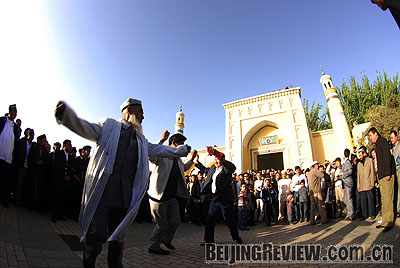|
 |
|
FESTIVAL CELEBRATION: Kashi residents celebrate the Fast-Breaking Festival on October 2 by dancing in the Id Kah Plaza |
The city is close to China's border with India in the south and central Asia to its west. Marco Polo (1254-1324), one of the first Westerners to travel to China along the Silk Road, once described Kashi as the "Cairo of the East."
A terrorist attack erupted on the morning of August 4 this year, when terrorists attacked a group of border policemen jogging in Kashi. Using a dump truck, homemade grenades and knives, they killed 18.
Three months have passed since August when nightmare haunted the city, and life is gradually brought to normal. Cheng Gang, a correspondent with the Beijing-based Global Times made a trip to Kashi in October. Below are excerpts from his account of the journey.
Business as usual
The plane landed at Kashi airport after midnight Beijing time. As Kashi is the western-most city in China, because of the time difference, it was only 10:30 p.m. local time. At the airport the crowds were boisterous. Some came to pick up relatives or friends, some were expecting tour groups, and taxi drivers were waiting for customers. Almost all the flights from Urumqi to Kashi arrived around the same time causing a flood of people. The atmosphere was that of a thriving city. It seemed like the riot that took place a few months before had not shrouded the city in tension, let alone terror.
I took a taxi through clean streets lit by pretty lamps and passed an evening market packed with people. The driver said, "The attack had an impact on people's perception of Xinjiang from outside the region. The number of visitors coming here has dropped. This should be the peak travel season in Kashi, when it's hard to find a vacant hotel room. But for local residents like me life goes on as usual.
"We know what those extremists were attempting to achieve, and we know they won't get what they want. On August 4, the day of the attack in Kashi, people still went to work or to school as usual. We were angry, but not afraid. In all these years, Kashi has been a fairly safe place overall."
I stayed in Kashi for a few days to experience life in the city. In the morning, Kashi's streets were filled with children walking or riding bicycles to school. They wore school uniforms and looked relaxed and in lively spirit. In the vegetable and fruit wholesale markets, most of the sellers were from the Uygur or Hui ethnic groups, while the customers were from a variety of ethnic groups. The markets were crowded. It was shortly before the Fast-Breaking Festival, a traditional time for family reunions, and the Central and West Asia International Trade Market, the largest market in Kashi, was packed with local residents and tourists.
In the evening, a large cement playground at the side of a traffic artery in Kashi was full of young people exercising, playing basketball and volleyball or skipping. They stayed until it was dark.
The People's Plaza in downtown Kashi seemed a favorite place to take a stroll after supper and was also full late into the evening.
Some security precautions reminded people of the August 4 attack. For instance, many organizations were guarded by security men in combat clothes who wore badges signaling that they were members of the emergency team.
Economic repercussions
Market stall owners in Kashi are still feeling the economic effects of the incident. The city is famous for its fruits and October is grape harvest season. Last year at this time a kilo of grapes sold for 6 yuan ($0.9), but this year the price had fallen to around 2 yuan ($0.3). A Uygur man working as a fruit wholesaler said, "Because of the attack, few grape distributors came to Kashi, which dramatically reduced the sales volume of grapes in other areas. Grapes have to be sold at a lower price here. The attackers were really insane. About 90 percent of the residents in Kashi are Uygur people.
Kashi is located in Kashgar Prefecture, which also has jurisdiction over several counties. In recent years, the prefecture has enjoyed rapid economic growth. According to official statistics, in 2007, its GDP reached 21.65 billion yuan ($3.17 billion), up 30 percent from the previous year, and in the first half of 2008, its GDP grew by 34 percent from the same period last year. The prefecture government hopes to maintain a steady average annual growth rate of 20 percent by 2010.
Agriculture used to account for about 80 to 90 percent of Kashgar's GDP. The area is well known for its grains, cotton and fruits. The prefecture government would like to change its economic structure and attract more outside investment and projects into the prefecture.
A priority in maintaining high-speed economic development in Xinjiang is to maintain confidence in the stability and security of the region, said a leading Kashgar official. The terrorist attack in Kashi made people worry about the city's stability, the official added, but he was confident that normal social order would soon be restored.
During my stay in Kashi I learned that the most successful outside investors here are business people from Wenzhou in east China's Zhejiang Province. They own several landmark buildings in the downtown area, and many have resided in the city for more than a decade.
When asked about the impact of the attack, Lin Wenjun, CEO of Far East Group in Kashi, said he felt security was not a problem. The biggest difficulty he said was the deterioration of the business environment, which really had nothing to do with the terrorist attack, but was caused by fluctuations in the exchange rate and adjustments to the export rebate policy that have made it more difficult to export. | 